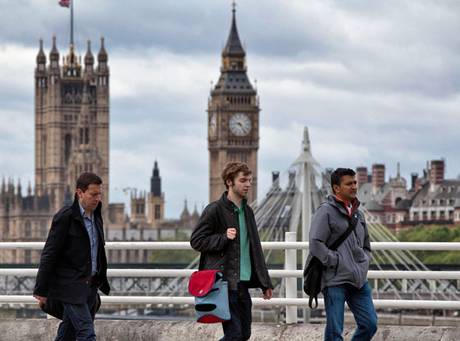當前位置: Language Tips> 新聞播報
分享到

Writer:Cecily Liu
Steven is 45. Despite having lived in Dublin for over 30 years something is still missing for him to call it 'home'.
I met Steven on my way to Dublin Airport at the end of a business trip. A cheerful, talkative fellow with a friendly smile, Steven spoke with a strong Irish accent. He drinks Guinness, plays Gaelic football, and as a local taxi driver, has probably visited every street of the city. But his childhood years spent in Swansea makes him feel Welsh.
"I often wonder where home is for me, I'd like to think it's Swansea but I have a life here now," he explained to me, as if trying to convince himself. Having left Swansea as a teenager, he has since lost contact with all his childhood friends, and most of his family left there too.
His words surprised me, as I had assumed cultural similarities and ease of movement across Europe deemed the concept of home irrelevant. I had thought high tech communications in our globalized world would have collapsed the 250 miles distance between Dublin and Swansea to almost none. I had thought that Steven's Caucasian look would help him fit in, that in Dublin no one would constantly ask him the 'where are you from' question.
I was wrong.
But I should not have been surprised. Despite growing global connectivity, identity is still central to people's hearts, and the UK's Brexit vote was perhaps one dramatic consequence of such emotions.
Looking back at my own life I felt perhaps I share Steven's dilemma. I was born and grew up in Chengdu, in South West China, but after living for eight years in London I have made many local British friends and learnt to appreciate British humor. Even London's dark and gloomy rainy weather has seeped into my personality, I quite miss it on sunny days.
With a reputation as one of the world's most multicultural cities, London always makes its residents feel welcome regardless of their origin. But I also felt a little "something missing", in Steven's words.
Meanwhile Chengdu has changed beyond recognition, thanks to China's unprecedented economic growth and huge infrastructure investment in recent decades. Our flat in Chengdu, in what was once a calm residential area, now is at the heart of the city surrounded by skyscrapers and busy traffic. Crossing those eight lane roads alone makes me feel scarred in a strange way.
With tens of millions of Chinese living overseas today, the Chinese has been the largest overseas diaspora for over a decade.
"Do feel home here? Will you stay or return to China?" Those have become standard questions to initiate a conversation between Chinese people on the streets of London, Paris and New York. A lengthy conversation would flow without exception, and after sharing their fond memories of China, even strangers quickly become friends.
As China increasingly opens up to the world, more and more Chinese will travel abroad to work, study and live, but China will remain forever a home for them. And sitting in Steven's taxi, witnessing his love for Swansea, I realized the heart's yearning for a place to call home is universally shared.
Broadcaster

Cecily Liu is a London correspondent for China Daily, covering mainly financial news. She was born in Chengdu, grew up in New Zealand, and graduated from University College London with a BA in English Literature.
上一篇 : How to reduce our carbon footprint
下一篇 :
分享到
關注和訂閱

電話:8610-84883645
傳真:8610-84883500
Email: languagetips@chinadaily.com.cn